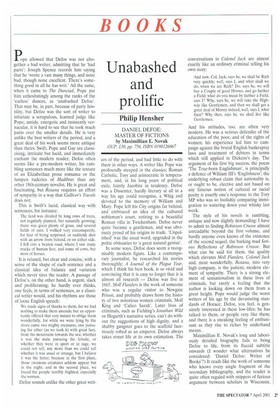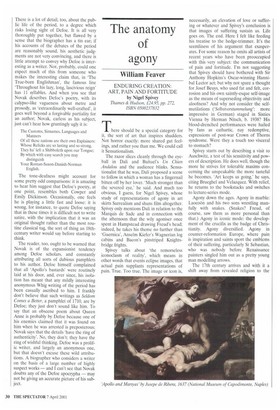Unabashed and prolific
Philip Hensher
DANIEL DEFOE: MASTER OF FICTIONS by Maximillian E. Novak
OUP, £30, pp. 756, ISBN 0198126867
Pope allowed that Defoe was not alto gether .a bad writer, admitting that he 'had parts'; Joseph Spence records him saying
that he 'wrote a vast many things, and none bad, though none excellent. There's something good in all he has writ.' All the same, when it came to The Dunciad, Pope put him unhesitatingly among the ranks of the `earless' dunces, as 'unabashed Defoe'.
That may be, in part, because of party hos tility, but Defoe was the sort of writer to infuriate a scrupulous, learned judge like Pope; untidy, energetic and insistently ver nacular, it is hard to see that he took much pains over the smaller details. He is very unlike the best writers of the period, and a great deal of his work seems more antique than theirs. Swift, Pope and Gay are classi cising, intricate but lucid, and immediately enchant the modern reader; Defoe often seems like a pre-modern writer, his ram bling sentences much more like the texture of an Elizabethan prose romance or the lumpen ruderies of Hudibras than any other 18th-century novelist. He is great and fascinating, but Roxana requires an effort of sympathy in a way that Gulliver's Travels does not.
This is Swift's lucid, classical way with sentences, for instance:
The land was divided by long rows of trees, not regularly planted, but naturally growing; there was great plenty of grass, and several fields of oats. I walked very circumspectly, for fear of being surprised, or suddenly shot with an arrow from behind, or on either side. I fell into a beaten road. where I saw many tracks of human feet, and some of cows, but most of horses.
It is relaxed, but clear and concise, with a sense of the shape of each sentence and a classical idea of balance and variation which never tires the reader. A passage of Defoe's, on the other hand, is urgent, slack and proliferating; he hardly ever thinks, one feels, in terms of sentences, as a classical writer would, and his rhythms are those of loose English speech:
We made signs of thanks to them, for we had nothing to make them amends; but an oppor tunity offered that very instant to oblige them wonderfully, for while we were lying by the shore came two mighty creatures, one pursu ing the other (as we took it) with great fury, from the mountains towards the sea; whether it was the male pursuing the female, or whether they were in sport or in rage, we could not tell, any more than we could tell whether it was usual or strange, but I believe it was the latter; because in the first place, those ravenous creatures seldom appear but in the night; and in the second place, we found the people terribly frighted, especially the women.
Defoe sounds unlike the other great writ ers of the period, and had little to do with them in other ways. A writer like Pope was profoundly steeped in the classics; Roman Catholic, Tory and aristocratic in temperament, and, in his long years of political exile, faintly Jacobite in tendency. Defoe was a Dissenter, hardly literary at all in a way his age could recognise, a Whig and devoted to the memory of William and Mary. Pope left his City origins far behind, and embraced an idea of the cultured nobleman's court, retiring to a beautiful Roman villa in Twickenham. Defoe never quite became a gentleman, and was obviously proud of his origins in trade. 'Unpolished' was the usual word, upgraded in the polite obituaries to 'a great natural genius'.
In some ways. Defoe does seem a recognisably modern figure. Like a contemporary journalist, he researched his stories thoroughly; A Journal of the Plague Year, which I think his best book, is so vivid and convincing that it is easy to forget that it is almost all research — Defoe was five in 1665. Moll Flanders is the work of someone who was a regular visitor to Newgate Prison, and probably draws from the history of two notorious women criminals, Moll King and 'Calico Sarah'. Later lives of criminals, such as Fielding's Jonathan Wild or Hogarth's narrative series, can't do without the suggestions of high dignity, and a shabby gangster goes to the scaffold facetiously robed as an emperor. Defoe always takes street life at its own estimation. The conversations in Colonel Jack are almost exactly like an ordinary criminal telling his own story:
And now, Col. Jack, says he, we shall be Rich very quickly; well, says I, and what shall we do, when we are Rich? Do, says he, we will buy a Couple of good Horses, and go farther a Field: what do you mean by farther a Field, says I? Why, says he, we will take the Highway like Gentlemen, and then we shall get a great deal of Money indeed; well, says I, what then? Why then, says he, we shall live like Gentlemen.
And his attitudes, too, are often very modern. He was a serious defender of the education of the poor, and of the rights of women; his experience led him to campaign against the brutal English bankruptcy laws and treatment of debtors in terms which still applied in Dickens's day. The argument of his first big success, the poem 'The True-born Englishman', is principally a defence of William III's 'Englishness'; the underlying robust claim that nationality is, or ought to be, elective and not based on any fatuous notion of cultural or racial purity is exactly one's response to the Tory MP who was so foolishly comparing immigration to watering down your whisky last week.
The style of his novels is rambling, antique and now slightly demanding: I have to admit to finding Robinson Crusoe almost unreadable beyond the first volume, and hardly anyone even knows of the existence of the second sequel, the barking mad Serious Reflections of Robinson Crusoe. But what can be said for them, the quality which elevates Moll Flanders, Colonel Jack and, most wonderfully, Roxana, into very high company, is the patient, modern element of sympathy. There is a strong element of sensationalism in these lives of criminals, but rarely a feeling that the author is looking down on them from a great height. Pope would judge the worst writers of his age by the devastating standards of Horace; Defoe, you feel, is genuinely interested in these low-lifes; he has talked to them, or people very like them; and there is a sneaking feeling of enthusiasm as they rise to riches by underhand means.
Maximillian E. Novak's long and laboriously detailed biography fails to bring Defoe to life, from its flaccid subtitle onwards (I wonder what alternatives he considered: 'Daniel Defoe: Writer of Books'?) It reads like the work of someone who knows every single fragment of the secondary bibliography, and the reader is quite often regaled with snippets of furious argument between scholars in Wisconsin. There is a lot of detail, too, about the public life of the period, to a degree which risks losing sight of Defoe. It is all very thoroughly put together, but flawed by a sense that the biographer has a tin ear; if his accounts of the debates of the period are reasonably sound, his aesthetic judgments are not very convincing, and there is little attempt to convey why Defoe is interesting as a writer. Nor, probably, could one expect much of this from someone who makes the interesting claim that, in 'The True-born Englishman', the famous line 'Throughout his lazy, long, lascivious reign' has 11 syllables. And when you see that Novak describes Defoe's poetry, with its calypso-like vagueness about metre and prosody, as 'extraordinarily well-crafted', it goes well beyond a forgivable partiality for an author; Novak, earless as his subject, just can't hear how gruntingly ugly it is:
The Customs, Sirnames, Languages and Manners Of all these nations are their own Explainers: Whose Relicks are so lasting and so strong. They ha' left a Shibboleth upon our Tongue; By which with easy search you may distinguish Your Roman-Saxon-Danish-Norman English.
The tone-deafness might account for some pretty odd comparisons: it is amazing to hear him suggest that Defoe's poetry, at one point, resembles both Cowper and Emily Dickinson. Occasionally, one feels he is playing a little fast and loose: it is wrong, for instance, to quote Defoe saying that in these times it is difficult not to write satire, with the implication that it was an original thought rather than the most routine classical tag, the sort of thing an 18thcentury writer would say before starting to think.
The reader, too, ought to be warned that Novak is of the expansionist tendency among Defoe scholars, and constantly attributing all sorts of dubious pamphlets to his author. Defoe himself complained that all 'Apollo's bastards' were routinely laid at his door, and, ever since, his isolation has meant that any mildly interesting anonymous Whig writing of the period has been casually ascribed to him. I frankly don't believe that such writings as Seldom Comes a Better, a pamphlet of 1710, are by Defoe; they just don't sound like him. To say that an obscene poem about Queen Anne is probably by Defoe because one of his enemies claimed that it was found on him when he was arrested is preposterous; Novak says that the details 'have the ring of authenticity'. No, they don't; they have the ring of wishful thinking. Defoe was a prolific writer, and largely an anonymous one, but that doesn't excuse these wild attributions. A biographer who considers a writer on the basis of a large number of highly suspect works — and I can't see that Novak doubts any of the Defoe apocrypha — may not be giving an accurate picture of his subject.



























































 Previous page
Previous page